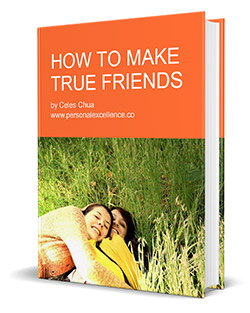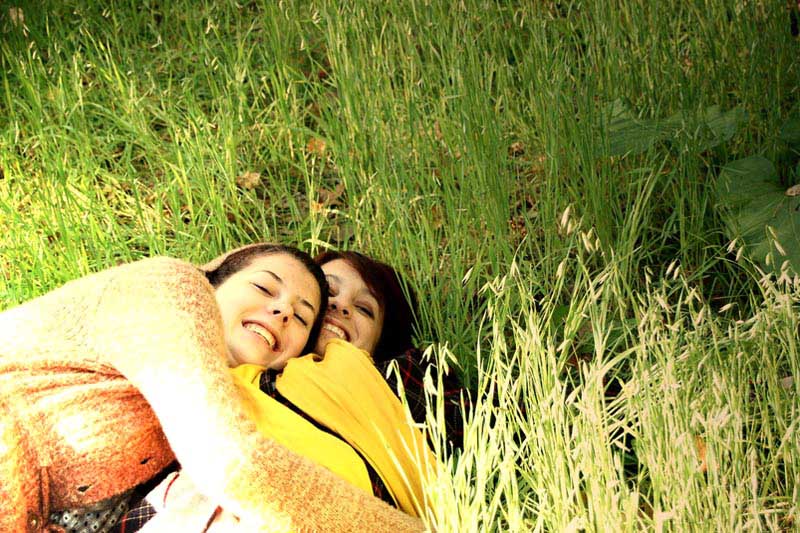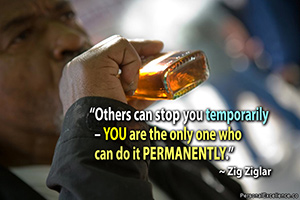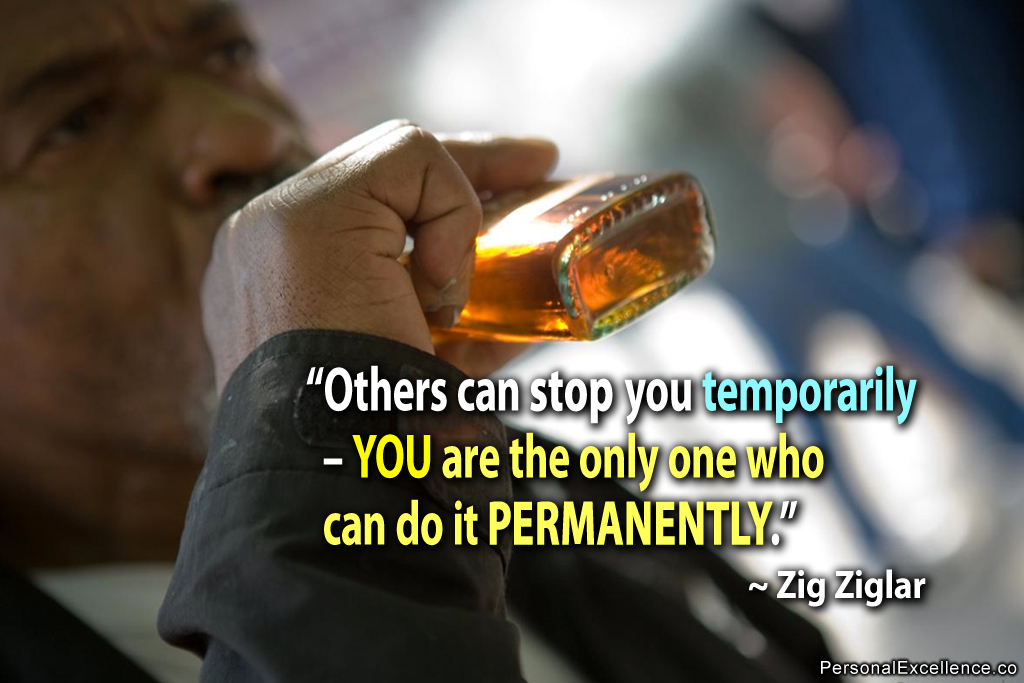

(Image: Jaci Berkopec)
Have you ever experienced times when you want a listening ear, but you can’t find one? Times when you feel lonely and down, but there’s no one you can speak to? Times when you wonder how you can have all these friends and contacts in your social media list and phone book, yet you’ve never felt more alone in this world?
I felt exactly like that last week.
Aloneness in a Sea of Friends
Last week, I was feeling depressed about something (not relevant to this post, and I don’t remember what it’s about anymore) and wanted to talk to someone about it.
As I looked through my phone list for someone to reach out to, I realized to my utter disappointment that there was no one I felt I could talk to.
This is not the first time I felt this way. There have been other times where I felt there was no one there for me in this world. Times when I was down and out; when I felt I needed a break (not a rest, but like a break from the world); when I felt unappreciated; when I felt heavy amounts of self-contempt. While such situations do not occur all the time, there have been moments when I feel this way. And when they happened in the past, there were times when I was unable find someone, a fellow friend whom I trust, to confide in.
It was depressing. Original problem aside, it was even more depressing not to have someone whom I could reach out to. It’s quite a hollow feeling when you have an entire phone list of friends, colleagues, business associates, relatives, acquaintances, social buddies, but not feel like there’s any one you can call and speak to. That somehow, out of the all the hundreds or perhaps a thousand people I knew out there, that there wasn’t one – not even one – person whom I felt I could call at that moment when I felt down and out.
It felt as if these connections were facades. That while I’m friends in name and form with all these people out there (name meaning the labels in our relationship like colleagues/friends/pals/etc.; form meaning we may occasionally meet up and all), all the mingling, the socializing, the interactions, are nothing but a big charade at the end of the day.
The Different Friends in Our Life
Friends come and go. I guess it’s a fact of life. The friends whom I used to be able to reach out to, and air my thoughts openly – the friends whom I’ll consider my true, soul friends, have faded out of my life in the past few years.
Two of my best friends recently relocated to another country. One due to work, and another due to personal reasons. When they left, a part of my inner circle became broken. One of my good friends has been MIA for the past few months, partly because I think his girlfriend opposes to him talking to me, probably because we were good friends. Another good friend from back in school has been inaccessible for a good part of our friendship in the past few years. Despite me informing him about the issue, it has never improved. It made me realize that perhaps our friendship was never as close as I thought it was. Then there was my best friend of 10 years from the past, whom I broke away from a few years ago, because our friendship had reached a point where it became toxic rather than elevated us.
There had been other friends whom I used to call and talk about whatever’s on my mind. These were friends I knew from back in school and in my previous workplace, and I was very close to them for a period of time.
But time saw us drifting away from each other as we became occupied with different things in our lives – me with Personal Excellence and my personal development business, and them with their work and/or partners. I guess things have changed as well since then. Even though I have made numerous attempts to keep in touch over the past few years, I can’t say everyone is as committed to stay in touch.
For other people on my list, they are normal/good friends, but not the kind of friends I’d call and go into some psycho babble. Firstly, I do not feel close to them – at least, not close enough where I’d want/expect them to drop everything they’re doing and listen to me just because I’m feeling down. The trust has just not been established.
Many of them are social friends – activity buddies whom I hang out with for dinners, lunches, meet-ups, etc with. But our friendships have never developed beyond just being activity mates. Even though I may want to get to know them better, sometimes I feel an iron wall between us – one they erected because they don’t want to let people in. The interactions never go beyond superficial discussions and slapstick jokes, which fade away in distant memory the next day, never to surface again. Many times, I can’t help but feel that I don’t know them at all, just like how they don’t really know who I am as well.
Secondly, the context of our friendship is not one where I can say something and expect them to understand where I’m coming from. Most people know me as someone who’s strong, confident, knowledgeable, and for what it’s worth, that’s predominantly the person I’ve become today.
But there’s also a sensitive, emotional, doubtful, vulnerable, self-debilitating side of me deep down inside, who unveils herself when times are tough and no one’s looking. If any regular friend is to see me like that, the person would probably think I have gone off the deep end, or I’m undergoing some serious mental issues. The person would never be able to understand nor comprehend. Close friends, on the other hand, would know me enough not to judge or overreact.
Thirdly, because everyone has his/her viewpoints and experiences in life, I don’t open up to everyone about everything. Rather, I select the friends who have relevant background and understanding about what I’m doing/going through, so it’s easier to share, discuss and connect with.
For example, I’m not going to discuss my blogging goals and strategies if someone has absolutely zero background about blogging, because it’s not going to be a constructive discussion (compared to when I talk to someone who’s in the field too). I’m also not going to talk about emotional eating if the person has not been through it before. It’s all related to point #2, regarding context. With people who have not gone through that same experience before, they can end up judging/imposing, or unable to help or advise on the situation. Even if they may have the best intentions, the chats can sometimes leave me more frustrated than before we talk.
Anatomy of Authentic Relationships
As I mulled over my feeling of emptiness, I couldn’t help but wonder what make our best friends, best friends. What is it that makes us decide if this is someone we want to reach out to when we feel down? Why is it that I feel more inclined to contact certain people, but not others? Why is it that the same, few names pop into my mind, whenever I feel weak, vulnerable, and depressed?
And most importantly: How can we extend this kind of relationship to everyone around us as well, since this kind of heartfelt, unadulterated connection is arguably the highest form of friendships that one would like to get?
To find the answers to my questions, I began to sieve out the people whom I consider myself to be close to, whether today or at some point in the past. I thought about the people whom I had reached out to confide in before. I thought about the people whom I used to feel safe sharing my darkest thoughts and feelings with. I thought about the people whom I used to think about contacting whenever I was in a fix.
As I analyzed these friendships, I began to see commonalities among them:
- These people had, at one point in time, been there for me when I was down in the past.
- These people had never once judged me, criticized me, nor been negative to me.
- These people had supported and encouraged me before in my life.
- These were people whom I got to know better before our friendship progressed, due to the presence of a common “space”, such as school, a workplace, a business project, and so on.
Out of all these friendships, there wasn’t a set point where they suddenly switched from hi-bye/regular friendships to a deeper friendship overnight. Rather, it was more of a progression:
- We knew each other under a certain context, be it work/school/life (length of friendship not withstanding).
- They had been supportive in the friendship all along, and had always looked out for me, one way or another.
- Because of that, it built the trust, from me to them.
- Over time, it led me to confide in them during the points when I faced challenges in my life.
- The experience made the friendship even stronger.
If anything, the starting point for these true, authentic friendships was their unconditional kindness, their non-judgmental nature, their supportiveness, and their giving spirit. Without any of this, the friendships would never have blossomed the way they did. Without these, I would never have confided in them, and these friends would never have become my good friends.
Being a Best Friend vs. Having Best Friends
When I was thinking about this, I realized to my horror that I have not been any of these to my friends out there. I have not been working on building my friends’ trust in me. I have not been understanding, supportive nor encouraging to others. I have not placed others’ needs before mine. I have not been very interested in what others are going through in their lives.
In short, I have not been a best friend to others.
Suddenly, I felt so incredibly ashamed of myself. That while others have been giving to me all along, I have not been giving to others. That while people have been supporting me in different stages of my life, I have been taking it for granted. That instead of checking how others are and whether they’re doing okay in their lives, there I was, feeling sad for myself because I didn’t have anyone I could speak to about my issues.
Why should I expect others to be there for me if I have been that way to others? Why should I feel disappointed and complain to the universe about my lack of confidants, when I have not been that to others around me? Why should I expect others to be best friends to me, when I have not been a best friend to others?
I realized that I have been selfish in how I have been approaching my friendships. I realized I have taken my friends for granted – expecting them to be there all the time, assuming they would be there when I need them. I realized I have also been relying on circumstances and the world to bring me great friendships vs. making the effort to create them. I realized that I had no right to expect the world to hand me authentic friendships, when I had not made an effort to cultivate such friendships to begin with.
Before expecting others to be there for me all the time, perhaps the question to ask is this: Have I been a best friend to others first?
I realized it’s possible for us to create true, close friendships – as many as we want, in fact. It’s a matter of us taking the first step, reaching out to others, establishing trust and bridging the divide. But first, we’ve to make the conscious effort to build the friendships to begin with. Because until we do, the gap between us and the other souls out there will remain as they are. It’ll not close by itself without hard work and desire.
How to Create More Authentic Connections (i.e. How to Have More Best Friends)
“A friend is one to whom one may pour out all the contents of one’s heart, chaff and grain together, knowing that the gentlest of hands will take and sift it, keep what is worth keeping and with a breath of kindness blow the rest away.” — Proverb
In 10 Useful Tips To Make New Friends, I mentioned there are 3 types of friends. Hi-bye friends, regular social buddies, and true-soul friends. I shared how we can make new friends in general, but did not cover specifically on making true, soul friends.
For the rest of today’s article, I’ll share with you my heartfelt guide on how to create true, soul friendships. Rather than wait for the universe to hand you your best friends, it’s up to us to go out there and create such friendships. Of course, you can’t control whether others want to return the effort or not, but I do truly believe that when we give out of the goodness of our heart, and when we connect authentically with the intention to help them, other people will reciprocate too.
Not only that, we’ll also attract like-minded people who want to create authentic connections too. By focusing on the steps below in the guide, it’s a matter of time before the best of the best friendships will unfold before you.
I also want to state that I’m using “best friends” loosely to represent close, heartfelt, authentic connections. It stands for people whom you know you can readily reach out to whenever you need help; people whom you know will be there for you no matter what happens. These are the most real, most true connections you can ever have in life.
1. Be a great friend to others first (Think about how you can give vs. receive)
Before we think about having more best friends, we should do some self-evaluation and ask ourselves if we have been best friends to others first. Because if we haven’t, then there’s some internal work to be done. How can we expect others to be our best friends, if we’re not even that way to them first? What right do we have to expect that from people out there?
I was talking to a good friend a couple of months back or so (on the topic of love), and this comment came up about making relationships work — “Think about how willing you are about giving first, versus what you expect from the relationship”. (Not word for word, but something along those lines.) That gave me somewhat of an aha moment, because I realized that this was not how I had viewed relationships at all. I had always been (implicitly) seeing them as what I could get out of them, vs. what I could give to the relationship itself. That was definitely some food for thought. I couldn’t help but do quite a bit of self-reflection after that.
While the point above was made in the context of romantic relationships, it applies to friendships too. Some questions for you to think over:
- How much are you willing to give to your friendships to make them work? A lot? A little? Nothing?
- How willing are you to be a best friend to others? Do you recognize that a friendship is a 2-way relationship?
- Do you recognize that making friendships work is about first being that best friend to others first?
If you understand the above, I’ll say you’re in the right place to make meaningful, genuine relationships. If not, perhaps you’re in no place to expect others to give you unconditional kindness.
I’d never thought about how I could be a best friend to others, but instead thought about which of my friends were better friends compared to others. But now it’s different as I focus on giving vs. receiving in my friendships.
2. Identify who you want to build authentic relationships with
Not everyone is a compatible match when it comes to creating authentic, high quality relationships.
For one, different people vibrate at different consciousness levels, and that already filters out the people you can connect with. Someone who’s at the level of fear obviously isn’t a good match for someone who’s at the level of courage. The former will be hesitating from making decisions in fear of ramifications, while the latter will be eager to take bold steps and create results in his/her life. Because of this, the former may end up holding the latter back. The former may become dependent on the latter on decisions and directions in life, which creates a parasite-host situation.
Likewise, someone who’s at the level of guilt wouldn’t be a good match for someone at the level of pride. The former is in a constant state of anguish and regret, while the latter may make use of the former’s guilt to build his/her life. This may result in a manipulative, backhanded relationship.
Secondly, different people have different values. Your values are like the big rocks holding the friendship in place. People with similar values will have little problem connecting with one another. The friendship blossoms almost naturally. However, when people with different values get together, they might find the friendship stifling instead. They may find themselves disagreeing and having conflicts more often than they support one another. My past friendship with K is an example of how friendships built on diverging values can stifle us.
Ideally, your best friendships are built with people who (a) vibrate at a similar consciousness level as you, or one level above/below yours. If the levels are too far apart, it’ll be hard for both of you to connect. (b) have similar values as you do.
That’s not to say that you ignore people who don’t fit either criteria. No, not at all. Remember #1 on being a best friend to others first – this applies to everyone, regardless on their consciousness level or values. If there’s a friend who needs you, then be there for them, no matter who he/she is. Point #2 isn’t about discriminating or alienating certain friends – It’s just about consciously selecting people whom you want to further your friendship with. At the base level, you should continue to be a best friend to everyone in your circle, where you can.
Let’s do a simple exercise now – Look through your connections list, and think about the people whom you’re most eager to build a better relationship with. Pick out at least 3-5 people.
- It may be an acquaintance whom you’ve only met once (or only corresponded through email), but you feel there’s potential to bring the relationship to the next level. This person may have exuded some vibes which made you feel positive about him/her.
- It may be a business contact you’ve been working with professionally, but haven’t had the chance to know about him/her personally.
- It may be an old friend whom you’ve been in touch with on/off, but never made the effort to know him/her better.
As I did this exercise, I picked out 7 people. They include a course-mate from my ex-university whom I’ve been out of touch with, 3 contacts I’ve made in the course of running my business (only met each of them 1-2 times before), one business partner I’ve been working closely with for the past year for my workshops, one like-minded business owner, and a recent client who contacted me for a workshop engagement. Most of them are people whom I do not know very well (yet), but I’d love to get to know better. These are also people whom I got pretty good vibes from in the few times we’ve contacted each other.
When you’re done, go to the next step.
3. Create opportunities to know each other
The next step after #2 is to create opportunities to bond with them.
Before I regarded my best friends as best friends, we started off as regular friends. It was after knowing them better that I slowly became more open with them. How did we get to know each other better? By being part of a common “space” that allowed us to hang out and know each other better. For example, being from the same school. Taking the same classes. Joining the same activities. Working in the same company. Working on the same projects.
So what should we do when there’s no longer such a context for us to make friends? Say when we graduate from school? When we leave a club/group/association? When we quit our jobs? How about people who become self-employed, where they’re not part of any organizations but themselves? Wouldn’t everything come to an end?
Well, not quite. If that “space” where both of you used to be a part of disappears because of a progression in your life path, or if the space doesn’t exist in the first place, then it’s up to you to create it! Create opportunities for you to know each other, via asking them out.
There’s no need to wait or expect people to ask you out first. You can well do it yourself. The easiest way is to ask him/her out for tea, lunch, or dinner. If you have a party or gathering coming up, you can also invite him/her along. Maybe he/she will say no, but maybe he/she will say yes too.
If no one’s asking you out, it may be because it did not strike them that they can do so. It’s also possible that they take a passive stance towards friendships, as I did in the past – I was just waiting for the universe to drop good people on my lap. This was a poor approach. As I mentioned above, we have a role to play when it comes to creating authentic friendships. So let’s do that, and stop waiting for the world to drop best friends on our lap. Let’s work on earning our friendships rather than taking them for granted.
For example, last month I initiated a meet-up with an old friend. There was no premise for the meet-up at all – I just thought of the friend one day, thought that we hadn’t met up for a while, and sent a text message to see if she wanted to meet up in that same week. I was well expecting her to reject me and say that she was busy for the whole week.
As it turned out, she was free – and we met up the next day, below my flat, where we chatted for 4 hours, up till almost midnight. In this one meet-up, I think we got to know each other much better than the entire decade we knew each other. And all this, from sending a simple message with a simple intention to meet-up. In doing so, I created an opportunity, a space for us to know each other better, just like you should do so for your other friendships too.
4. Get to know them vs. Fringe topics
True, authentic friendships built on mutual understanding of each other. This only happens when you get to know the person as an individual.
When you meet someone, there are 2 types of discussions that can take place. One is where you chat about marginal, fringe topics, like what’s on the news, the weather today, the movies, tv shows, celebrities, latest gossip, and the like. The other is where you get to know the other person earnestly, from one soul to another – from aspirations to fears, from goals to dreams.
The first type of discussion will leave you feeling empty at the end of the meet-up, and quite frankly, does nothing to forward the friendship. At the end, it remains a superficial connection, characteristic of that between hi-bye friends and even regular friends. The latter, on the other hand, helps you know the other person on a deeper level, and goes a long way towards building the friendship between both of you. It’s the first step to building authentic connections.
If you want to further a friendship, get to know the other party personally. How is he/she doing? What has he/she been up to? How is he/she doing at work? Is he/she happy there? What’s been on his/her mind lately? Then just let the discussion flow from there. Make sure the discussion is split at least 50/50 between you/your friend. Be mindful when you’re talking too much, because you may be preventing your friend from sharing.
If you want to take the discussion to the next level, you can learn more about his/her aspirations, what motivates him/her, his/her highest goals and dreams, and more. If the person is earnest about building an open friendship, he/she will readily share, vs. seclude him/herself.
For me, getting to know someone is always an exciting process. Each person is multi-faceted, has his/her motivations that drives him/her, has his/her own story to tell, and a history that makes him/her who he/she is today. Knowing someone is like flipping a book and discovering the mysteries that lie within each page.
5. Focus on the positives, not the negatives
In connecting with others, you may experience qualities about them which you don’t like. Don’t let yourself shy away from that friendship just because of that though. Unless it’s a make-or-break issue (such as values mismatch), you should not let that get in the way of the development of the friendship.
It’s easy to harp on someone else’s faults, but such a mindset doesn’t help you build true friendships. Firstly, who’s to say whether something is a flaw or a not? At the end of the day, it’s all just one’s perception. Everything can always be interpreted 2 ways – negative or positive, and it’s up to you on how you want to perceive them. For example, an impatient person is efficient. A bossy person is good at taking charge. A quiet person is a good listener. A chatty person is sociable and lively. A critical person is sharp and honest. They are just 2 sides of the same coin.
Secondly, true friendships aren’t built on a premise where you pinpoint your friends’ every “flaw” and “mistake”. They are built under the context where the other party is non-judgmental and nurturing. If you think about it, do you like people who constantly criticize you and watch your every move? People who pinpoint and nitpick your mistakes? Or do you prefer people who see you for who you are? People who are encouraging and supportive? Chances are, it’s the latter.
You can’t change the person’s character (that’s his/her decision to make), but you can change how you see them. Be emotionally generous. Rather than harp on things you don’t like about someone, focus on the positives instead. Recognize his/her strengths, capabilities and skills. Give praise where appropriate. See each friend as who he/she is and who he/she can be, not who he/she isn’t. Be supportive and encouraging.
6. Share your life
A friendship is a 2-way effort. Besides getting to know the person (see #4), you should be ready to share your life with them too. You cannot keep expecting the other person to share if you don’t do any sharing yourself. The friendship will not progress this way.
Let them know what you’ve been up to. Share with them things you’re passionate about. Let them in on your goals and dreams. Let them know what’s on your mind. Be as open and honest with them as you can.
7. Build trust first
Do you recognize that for any friendship to progress, trust has to be built first? You can’t just waltz in one day and suddenly expect someone to open him/herself to you, just because you reached out and made the first effort. Friendships don’t work that way. You have to first build the trust, bit by bit.
When I think about what made me open up to my friends in the past, it was because they were somehow just always there for me, whenever I needed them. Looking back, it was because they made an effort to be a part of my life, whether through conscious or unconscious actions on their part. This led me to trust them, and learn to count on them.
For someone to let you in, you have to build the trust in the other person. And one of the ways is by making an effort to be a part of the person’s life, vs. just observing from the sideway. Some ways to do this:
- Drop him/her a sms or email every now and then to see how he/she is doing.
- Arrange for a meet up regularly, say once a month for starters, then more frequently if the friendship blossoms.
- On top of the normal lunch/dinner outings, suggest to go some place and do something different that’s in line with the person’s interests
- If the person is part of certain interest groups, join in to see how they are like. Get to know this side of his/her life that you’re normally not privy to.
- You can keep in touch via phone too. Do so only if you know the person is receptive to chatting on the phone, and if both of you are somewhat close. If both of you are not close, it’ll be good to check if it’s okay to call first, as the person may be busy with other things. Phone calls are intrusive in nature and may not be appreciated if you’re calling on non-urgent matters.
- Be in touch with what’s happening in the person’s life during the times when you are not meeting up. Social networking sites today, like Twitter and Facebook, makes it easy for you to that.
8. Let them in during your down times
This might not come across as an intuitive step, but it’s actually an important one.
If you’d like to build a true, authentic friendship with someone else, you need to open up to him/her.
Beyond just sharing about your life, your thoughts, and your feelings as I mentioned in #6, it’s also about being able to share your happiest times and your down times. The times when my friendships with others really advanced was when I shared with them the frustrations and challenges I was facing. When I did that, I gave my friends the opportunity to know more about me and my inner world, and I also gave myself the opportunity to further a friendship.
Some of you may hesitate about doing that, because you may feel that the other party may not want to hear about it, and you may just be intruding on the person’s space. I actually agree. My recommendation is to do it if the person has made the effort to know you (#4), is supportive (#5) and be a part of your life (#7). This way, you know this person is sincere about developing the friendship, and you know you can count on him/her.
Note that friendships where only one party shares become lopsided, and are generally not healthy. These are not really friendships, but more mentor-mentee relationships. Which is okay if that’s the intention, but not okay if you’re looking for an equal friendship. If you want to build a 2-way friendship, you should let the person in on your inner thoughts. This will encourage the person to share accordingly too. I’ve found from my friendships that when I share openly about what I feel and what I think, my friends are encouraged to follow suit too.
9. Support them: Be there for them when they need you
Support them by being there when they need you
As you do #1-#8, your friend may gradually open up to you. He/she may start to share with you his/her fears, concerns and obstacles he/she is facing in life.
Just like you want others to be for you when you’re in need, make sure you’re there for them as well. This is where you let him/her know via concrete actions that you’re a true friend who’s here to support him/her in his/her problems. Actions speak louder than words – at the end of the day, it doesn’t matter the things you say about the friendship, but but you do.
Don’t impose your judgment
Besides being there for them when they need you, it’s also about (a) being supportive and understanding and (b) listening without bias, i.e. not imposing your judgment.
Not too long ago, I confided in a good friend about my emotional eating issues. She kept writing it off, saying it was about eating right and exercising – even though I told her that this wasn’t the real problem and it was something more deeply rooted. I was angry and frustrated. The whole time, I didn’t feel like she tried to understand what I was saying. In the end, feeling dejected, I closed myself off. While we continued to be close, I never once talked to her again about my struggles with my weight and emotional eating, because I knew she wasn’t going to empathize with what I was going through.
While you may have your best intentions, you have to be careful about imposing judgments on others’ problems. Allow them to share openly, and help them to process what they’re going through. Don’t conclude or judge without hearing the person out. You may end off closing off a budding friendship.
Empathizing vs. Giving solutions
Sometimes people approach you because they are looking for a listening ear. Sometimes they approach you because they’re looking for solutions. Learn to recognize their needs and wear that hat accordingly. There’s no need to give solutions when the person is just looking for someone to hear him/her out.
Look out for implicit cries for help
Being there for them doesn’t happen only when they physically ask for help. A lot of times, people don’t “ask” for help explicitly. They may be afraid of troubling you.
You need to be sensitive to others’ needs. Keep yourself up to date of what’s happening in their lives (#7). Listen to sub-text of what a person says. Always keep a look out for ways to be a better friend to him/her. For example, if a friend has been troubled by work in the past week, you can ask him/her out to take her mind off work. You can also get a small present to cheer him/her out. It’s the littlest things you do that make the biggest difference.
10. Focus on those who reciprocate your efforts
In your efforts to reach out and connect, there are going to be times when your efforts are not reciprocated. For example, there are going to be friends / contacts who don’t respond. There are going to be people who tell you they are too busy to meet. And there are going to be people who keep canceling on you / pushing back on the appointment dates when you’re trying to accommodate to their requests and looking forward to the meet-ups.
It doesn’t matter though. I have friends or acquaintances who don’t respond to outreach requests or take a long time to revert; who keep saying they’re busy and set a 1-month lead-time for appointments when you’re just asking them out for a simple lunch/dinner; who cancel in the last minute or don’t even inform when they can’t come; and who play lip service to meet up requests.
In the past I would wonder why they make it so hard to meet, when I’m trying so hard to make our friendship work out. I’d feel quite annoyed and disappointed at them.
But then I realize that’s just the way they are. Maybe they are anti-social and prefer to be alone. Maybe they’re not at the stage in their life where they want to connect with other people. Maybe I’m just not an important-enough friend to them. Maybe meeting people and building friendships are not a priority in their life at the moment. After all, for a long time in the past, I prioritized work above all else, so I have been guilty of that.
Respect their choices. Rather than crib at the people who don’t reciprocate, hey — focus on the ones who do return your efforts. Let the latter group know how much you appreciate them taking the time to meet up. Be there for them when they need you. Spend more effort on cultivating relationships with people who care and make an effort, rather than those who choose to close themselves off to begin with. You’ll find connecting with the former much more rewarding. :)
Get the manifesto version of this article: [Manifesto] How To Create More Meaningful Relationships










 Thanks for reading. If you like my free articles, join my private email list and get my latest updates and articles sent right to your inbox.
Thanks for reading. If you like my free articles, join my private email list and get my latest updates and articles sent right to your inbox.